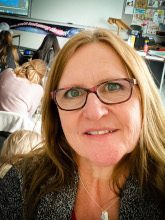

Inspired by the truth revealed in Laudato Si’ that the cry of the earth is linked with cry of the poor; and with the depth of Development and Peace’s For our Common Home campaign residing in my mind, heart and spirit, I felt compelled to create high school lesson plans that would invite educators and students to realize and activate their agency through a Catholic lens to care for our common home.
From the start, it was clear that an Indigenous lens had to be included. I am grateful for the guidance I received for this from Noela Crowe-Salazar, Jim Desroches, Brenda Ahenakew and Delvin Kanewiyakiho. It was also clear that a post-colonial, anti-oppressive and anti-racist framework was required.
To ensure such a framework and in the collaborative spirit of education, I called upon my good friend/educator Sherry Van Hesteren, who is deeply immersed in citizenship work and transformative education. We share a belief that Catholic education, at its best, and across curriculums, invites students into deeply understanding and committing to living the Gospel imperatives of Catholic Social Teaching. This is the work of activating citizenship through a Catholic lens.
The best Canadian example of deep commitment to a mission and vision based on Catholic Social Teaching is Development and Peace. Sherry and I knew that it was important to firmly lay the cornerstones of Catholic Social Teaching before inviting students into the more complex work of the Development and Peace campaign. Thus, were born the two modules of the Laudato Si’: A Call for Transformative Education For Our Common Home curricular resource.
The first module sets the cornerstones of the foundation—worldview (lens), Catholic Social Teaching, Laudato Si’ and an introduction to Essential Citizenship Competencies (from the Concentus Education Citizenship Foundation). Building on this foundation, the second focuses on Development and Peace’s campaign, A Future for the Amazon, a Future for All. In this module, as students learn about the Amazon biome and the struggles of the Indigenous peoples living there, they are invited to engage in actions of citizenship and solidarity. By learning and practicing the skills of recognizing agency and engaging in advocacy, students acquire the strength to move with respect, courage and confidence into the work of being lifelong engaged citizens in society.
The last lesson of the modules gives students an experience of becoming “unstuck” from a paradigm that has done much damage to Mother Earth and propels them into a new way of being in relationship with the Earth and one another for seven generations to come.
I have come to understand that post-colonial education is as much about pedagogy and honouring various ways of knowing as it is about selecting the right texts and stories. We walk softly and respectfully forward, deeply aware that we are in this beautiful world together as kin. I believe that together in solidarity, the human family can truly help build God’s world of peace and justice for all. This is the mission of Development and Peace and the heart of Catholic education.
We hope you enjoy the journey of the lesson plans.
Here’s what some teachers are saying about the modules:


“Piloting Module 1 in my Grade 11 classroom has been empowering for us all. Throughout, students were challenged to immerse themselves into new ways of thinking about our world and how we interact with it. We moved through the lessons with ease as they are well organized, clear, teacher-friendly and student-centric, using diverse and creative learning strategies. We found the accompanying resources current, varied and of high quality. But most importantly, my enthusiasm for teaching faith-based social justice has not only been supported and strengthened by this program, but encouraged beyond measure by the inspiration, resolution, faith, authenticity and hope that I have seen in the work the students are doing with it. I highly recommend it’s use in any classroom looking to engage and inspire the minds, hearts and energy of today’s young people in care For our Common Home.”
Gayle Brodie
Teacher/Chaplain,
St. Joseph High School, Greater Saskatoon Catholic School Division, Sask.


“I had the great pleasure of trying Module 1 with my grade 9 religious education class. While students are generally well-versed in stewardship for creation from other disciplines and media, the lens of kinship with all of creation emphasized by Pope Francis in Laudato Si’ is cleverly woven throughout the lessons in Module 1. The focus on the interconnectedness of humans within the bigger picture of our world is useful in developing a shared responsibility for all living and non-living parts of our planet. Through incorporating some Indigenous and Western views alongside the introduction of many Catholic Social Teachings, students are introduced to the inherent value of all of God’s creation. If we truly want to inspire change for the common good, Module 1 is a great foundation with which to begin a group’s examination of their own views as they consider an important shift needed to be living in today’s world.”
Carolyn Koropeski
Teacher, St. Ignatius High School
Thunder Bay Catholic District School Board, Ont.

